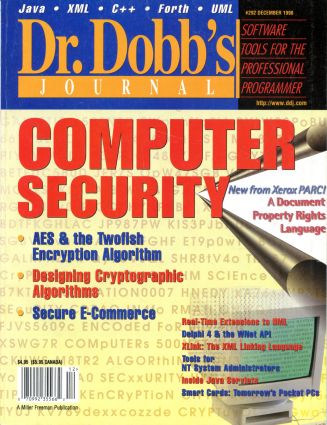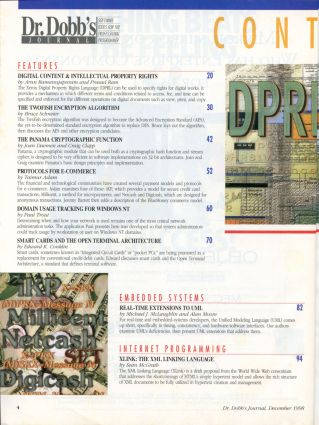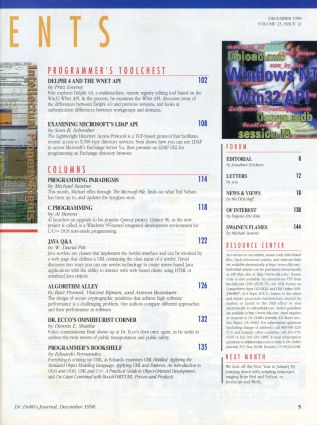
p.8 EDITORIAL
[author : Jonathan Erickson] #Edito
TABLE OF CONTENTS
FEATURES
p.20 DIGITAL CONTENT & INTELLECTUAL PROPERTY RIGHTS
[author : Arun Ramanujapuram and Prasad Ram]
The Xerox Digital Property Rights Language (DPRL) can be used to specify rights for digital works. It provides a mechanism in which different terms and conditions related to access, fee, and time can be specified and enforced for the different operations on digital documents such as view, print, and copy.
p.30 THE TWOFISH ENCRYPTION ALGORITHM
[author : Bruce Schneier]
The Twofish encryption algorithm was designed to become the Advanced Encryption Standard (AES), the yet-to-be-determined standard encryption algorithm to replace DES. Bruce lays out the algorithm, then discusses the AES and other encryption candidates.
p.42 THE PANAMA CRYPTOGRAPHIC FUNCTION
[author : Joan Daemen and Craig Clapp]
Panama, a cryptographic module that can be used both as a cryptographic hash function and stream cipher, is designed to be very efficient in software implementations on 32-bit architectures. Joan and Craig examine Panama's basic design principles and implementation.
p.52 PROTOCOLS FOR E-COMMERCE
[author : Taimur Aslam]
The financial and technological communities have created several payment models and protocols for e-commerce. Aslam examines four of these: iKP, which provides a model for secure credit card transactions; Millicent, a method for micropayments; and Netcash and Digicash, which are designed for anonymous transactions. Jeremy Barrett then adds a description of the BlueMoney commerce model.
p.60 DOMAIN USAGE TRACKING FOR WINDOWS NT
[author : Paul Trout]
Determining when and how your network is used remains one of the most critical network administration tasks. The application Paul presents here was developed so that system administrators could track usage by workstation or user on Windows NT domains.
p.70 SMART CARDS AND THE OPEN TERMINAL ARCHITECTURE
[author : Edward K. Conklin]
Smart cards, sometimes known as "Integrated Circuit Cards" or "pocket PCs," are being promoted as a replacement for conventional credit/debit cards. Edward discusses smart cards and the Open Terminal Architecture, a standard that defines terminal software.
EMBEDDED SYSTEMS
p.82 REAL-TIME EXTENSIONS TO UML
[author : Michael J. McLaughlin and Alan Moore]
For real-time and embedded-systems developers, the Unified Modeling Language (UML) comes up short, specifically in timing, concurrency, and hardware/software interfaces. Our authors examine UML's deficiencies, then present UML extensions that address them.
INTERNET PROGRAMMING
p.94 XLINK: THE XML LINKING LANGUAGE
[author : Sean McGrath]
The XML Linking Language (XLink) is a draft proposal from the World Wide Web consortium that addresses the shortcomings of HTML's simple hypertext model and allows the rich structure of XML documents to be fully utilized in hypertext creation and management.
PROGRAMMER'S TOOLCHEST
p.102 DELPHI 4 AND THE WNET API
[author : Fritz Lowrey]
Fritz explores Delphi 4.0, a multimachine, remote registry editing tool based on the Win32 WNet API. In the process, he examines the WNet API, discusses some of the differences between Delphi 4.0 and previous versions, and looks at authentication differences between workgroups and domains.
p.108 EXAMINING MICROSOFT'S LDAP API
[author : Sven B. Schreiber]
The Lightweight Directory Access Protocol is a TCP-based protocol that facilitates remote access to X.500-type directory services. Sven shows how you can use LDAP to access Microsoft's Exchange Server 5.x, then presents an LDAP DLL for programming an Exchange directory browser.
COLUMNS
p.114 PROGRAMMING PARADIGMS
[author : Michael Swaine]
This month, Michael rifles through The Microsoft File, finds out what Ted Nelson has been up to, and updates the Spyglass story.
p.118 C PROGRAMMING
[author : Al Stevens]
Al launches an upgrade to his popular Quincy project. Quincy 96, as the new project is called, is a Windows 95-hosted integrated development environment for C/C++ DOS text-mode programming.
p.122 JAVA Q&A
[author : W. David Pitt]
Java servlets are classes that implement the Servlet interface and can be invoked by a web page that defines a URL containing the class name of a servlet. David discusses two ways you can use servlet technology to create server-based Java applications with the ability to interact with web-based clients using HTML or serialized Java objects.
p.126 ALGORITHM ALLEY
[author : Bart Preneel, Vincent Rijmen, and Antoon Bosselaers]
The design of secure cryptographic primitives that achieve high software performance is a challenging problem. Our authors compare different approaches and their performance in software.
p.132 DR. ECCO'S OMNIHEURIST CORNER
[author : Dennis E. Shasha]
Police commissioner Bratt shows up at Dr. Ecco's door once again, as he seeks to address the twin towers of public transportation and public safety.
p.135 PROGRAMMER'S BOOKSHELF
[author : Eduardo Fernandez]
Everything is coming up UML, as Eduardo examines UML Distilled: Applying the Standard Object Modeling Language, Applying UML and Patterns: An Introduction to OOA and OOD, UML and C++: A Practical Guide to Object-Oriented Development, and Use Cases Combined with Booch/OMT/UML: Process and Products.
FORUM
p.12 LETTERS
[author : you]
p.18 NEWS & VIEWS
[author : the DDJ staff]
p.138 OF INTEREST
[author : Eugene Eric Kim]
p.144 SWAINE'S FLAMES
[author : Michael Swaine]

